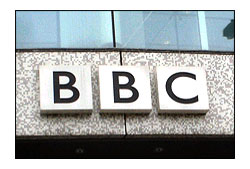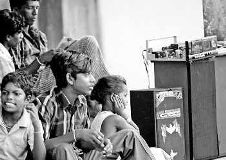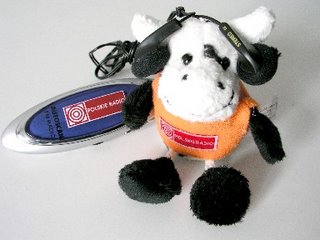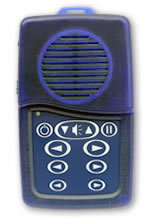
If you would like.... to here the first hand world news as it is happening from a big or small station Then.. If you live in South Asia and Radio listening is your favourite hobby then you must see this page everyday.
Friday, June 30, 2006
BBC planning to expand international activities
 BBC Worldwide, its commercial arm, is planning to expand its international activities by starting six new channels in the India and US. There is scope for "five BBC branded channels in addition to news in any major market" offering a mix of content from the BBC and other British broadcasters, BBC Worldwide's Chief Executive John Smith said.
BBC Worldwide, its commercial arm, is planning to expand its international activities by starting six new channels in the India and US. There is scope for "five BBC branded channels in addition to news in any major market" offering a mix of content from the BBC and other British broadcasters, BBC Worldwide's Chief Executive John Smith said. It is already active in India, a country in which the World Service has been operating for 75 years. The corporation, in partnership with Mid Day Multimedia, won seven FM Radio licences in Delhi, Mumbai and Bangalore last year.
Smith said India was "looking interesting" but added there were three or four parts of the world they were focussing on.
Last year BBC made a trading profit of Pounds 89.4 millions by selling British television, magazines and news media to the world.
The new channels will be funded
RADIO TIMES and 50 other popular magazines make the BBC Britain’s third largest publisher of consumer titles. The broadcaster now wants to replicate that power as part of its push abroad.
John Smith, the chief executive of the BBC’s commercial arm, said that the corporation had £350 million in unused borrowing, which could help it “make small acquisitions” internationally as it tries to export its formats abroad.
At the same time, Mr Smith said, he was hoping to make “tens of millions” from the BBC’s soon to be established bbc.com, the international website. That will feature a “limited range of carefully placed advertising” aimed at ensuring that the international internet edition breaks even.
As with television, the BBC has begun to dip its toe in the water with magazine expansion. Top Gear is published in 30 countries, while Teletubbies appears in Poland and Good Food in Romania. But these are only licence agreements, in which the BBC receives a modest royalty payment.
However, Mr Smith said that there was “scope to expand through joint-ventures and acquisitions” and demonstrate that the BBC wants to step up its activity as it builds an international television presence — cross-promoting titles built up with cash from the licence fee payer.
In India the BBC formed a joint-venture with The Times of India to create a magazine publishing operation owning 33 titles. The ubiquitous Top Gear is now published on the sub-continent and more familiar BBC brands are expected to follow.
The BBC may also try to expand its range of magazines in Britain, although any new title has to be programmerelated. It is considering, under the name Project Phoenix, publishing a current affairs title to compete with The Economist or The Spectator which could be based on Panorama or Newsnight.
The BBC’s international internet presence is also designed to ensure that web surfers overseas are not able to use BBC content for free, when British licence fee payers have paid for it. The corporation is careful to ensure that some of its online output — such as live coverage of World Cup games — is available only to viewers in the UK because that would otherwise affect international rights agreements.
The corporation’s thinking even extends to charging to watch programmes online for overseas viewers, as it tries to make its internet player become “the video equivalent of iTunes”.
Last year, BBC magazines made £19.3 million, down slightly after a number of titles that were not tied into programmes were sold. The bulk of the income comes from Radio Times, which accounts for about a third of turnover. Digital media profits, meanwhile, were a modest £3.4 million. Times Online and The Hindu)
Tuesday, June 27, 2006
New IRCs will be valid until Dec. 31, 2009
Monday, June 26, 2006
Radio Alakal for the fishermen's community in India
 Billed as the first of its kind in the country, broadcasts from FM Radio Alakal for the fishermen's community have become a hit in Kerala. Radio Alakal has earmarked one-hour slots in the morning, afternoon and evening aimed at the fisherman's community, journalist L. Ajith, the brain behind the radio, told IANS.
Billed as the first of its kind in the country, broadcasts from FM Radio Alakal for the fishermen's community have become a hit in Kerala. Radio Alakal has earmarked one-hour slots in the morning, afternoon and evening aimed at the fisherman's community, journalist L. Ajith, the brain behind the radio, told IANS. 'The FM radio benefits the community tremendously as it airs weather reports, folklore, and specialised programmes for women and children,' said Ajith, who also runs website Indiadisasters.org. The radio was launched May 1, thanks to the efforts of the Kerala Swathantra Matsya Thozhilali Federation (KSMTF), the South Indian
Federation of Fishermen Societies (SIFFS), Indiadisasters.org and the Society for Promotion of Alternative Computing and Employment (SPACE).
SPACE, promoted by the Kerala State IT Mission, provides technical support to the project. 'The operations are run from our office. We provide the technical and
programme support free of cost. Programme support costs us Rs.30,000 a month,' said Arun of SPACE. Ajith said under the present regulations, community radios (CRs) were
not allowed to air commercials.
'The central government has been urged to allow CRs to invite commercials from their local areas of operation with lower tariffs, and increase the range of transmission, which is presently 16 km from the place of broadcast,' he said. © 2006 Indo-Asian News Service
Source:http://news.monstersandcritics.com/
india/article_1175669.php/FM_radio_a_hit_
with_Kerala_fishermen
Saturday, June 24, 2006
RTI's English service is looking for more monitors

RTI's English service is looking for more monitors
around the world. If you are interested in becoming
one of our official monitors and are committed to
sending reception reports on a regular basis, please
send us a postcard, letter or email with the phrase 'I
want to be an RTI monitor.'
Send it to P. O. Box 24-38, Taipei, Taiwan, ROC
postmarked by July 10th, or email to rti@rti.org.tw.
Official monitors will get a certificate and a
souvenir as a small token of our appreciation. We look
forward to hearing from you soon.
+++++++++++++++++++++
Source:
http://english.rti.org.tw/Content/WhatsNewSingle.aspx?ContentID=16693
+++++++++++++++++++++
Friday, June 09, 2006
India Radio Forum 2006

Radio is playing as loudly as ever, with new licenses, new digital options, new funding sources and a host of innovative ways to connect with a wide range of audiences. And not only in India. Around the world, the radio dial is being revitalized and recognized anew as a valuable part of the media and content creation mix.
Radio’s long history means many of the questions about listening and hearing have already been answered. But the new media environment means as many remain to be answered.
• Is India keeping up with world trends in radio?
• Is there anything we need to know about the rest of the world that can be applied to the Indian radio landscape?
• What are the predictions for India’s radio scene?
• Just how many players are too many?
• How can radio be most effectively, efficiently and creatively added to the media mix?
• What do media buyers need to know – and how can this best be delivered – to make the most effective radio decisions possible?
• How niche is niche when it comes to audience segments for radio?
• What are the technologies that will make the most difference to radio players and to listeners?
• Is digital radio a good option or a fancy gimmick for India?
• What are the best regulatory models for radio in the next communications age – and how best can India move towards a modern and robust framework that will encourage growth?
• And last, but by no means least, what are the business models for a new radio environment?
Business/Technology Track
Join our panel of Government regulators, industry CEOs and the Ad community as they share their vision of creating a vibrant and diverse Indian Radio industry by the year 2010. What needs to happen to make this vision a reality? The panel will look at the industry's current strengths and weaknesses and how our current thinking will shape the future. This session is presented in two parts - presentations and the Q and A discussions.
Abraham Thomas,
Chief Operating Officer,
RED FM
Apurva Purohit,
CEO,
MBPL / Radiocity
Prashant Panday,
COO,
Radio Mirchi
Raj Gupta,
Chief Strategy Officer,
Lintas Media Group
Rajesh Tahil,
Station Director
GO 92.5
Tarun Katial,
COO,
Adlabs Films Ltd
A look at the major radio markets from around the world. Is there anything India can adopt and adapt? Are there any lessons in what to avoid? Is there any way to fast-track the radio roll out process? How can Indian radio broadcasters make the best use of the lessons learned in other markets?
Neil Curry,
Senior Commissioning Editor,
BBC World Service English Networks
Is the Indian market big enough to support all the new radio licenses being issued? And if it is, is there enough differentiation between the channels to build viable businesses? What new genres can be explored to offer listeners a real choice?
Anish Trivedi,
Chief Managing Director,
Banyan Tree
Hemant Mehta,
VP & Country Manager,
IMRB International,
Media & Panel Group
Vehrnon Ibrahim,
National Head of Programming,
Red FM
Listeners can obtain their music from a range of new stations as well as a raft of new technologies. The new ways of distributing audio content - the Internet, pod-casting, 3G, and Visual Radio – are making radio stations’ jobs more challenging but ultimately offering more opportunities. How can radio use technological innovations to enhance the listening experience? This session looks at the many opportunities now available and how advertisers and stations can benefit from them. In the new media environment what does it now take to strike gold?
James Cridland,
Director of Digital Media,
Virgin Radio UK
Nick Piggott,
Digital Content Manager,
GCAP Media
Media Buying and
Advertising Track
With sponsorship and on-air promotions growing year on year as a percentage of all radio revenues, we look at the long-term future of spot advertising. What is the optimal mix of traditional spot advertising and linked sponsorship? How do you marry programming demands with those of the sponsor without alienating your audience and delivering value to the client? This session will explore ways to successfully manage the mix of programming, advertising and agency sensibilities.
Chris Goldson,
Director of Sponsorship & Promotions,
Virgin Radio
Radio offers many unique advantages over all other advertising options yet it is often overlooked in media campaigns. We look at successful local and international campaigns that have included radio as a core component and see what factors ensured their success. Join our panel of experts from agencies. FMCG, and Radio sales and be inspired by the selection of results proven campaigns.
Douglas McArthur, OBE
Chief Executive,
Radio Advertising Bureau
Rahul Welde,
GM Media Hindustan Lever & Head - Media Services,
Unilever South Asia
Sam Balsara,
Chairman & Managing Director,
Madison World
Saugata Gupta,
Chief - Sales & Marketing,
Marico
Almost no media schedules use only one medium. But what is radio's role in the mixed media schedule? Radio doesn't have visuals, which sets it apart from all other display advertising media. So, instead of being simply additional exposure to visual media, radio influences a different part of the brain and multiplies the message. Presented by the UK's RAB, this session will look at radio's role as a multiplier with TV, print, outdoor and the Internet, and provide you the right stuff to make radio work for you.
Douglas McArthur, OBE
Chief Executive,
Radio Advertising Bureau
Programming Track
Strategies and ideas for content creation and delivering an advertiser-friendly audience. How to use value-added services to ensure audience loyalty. How to grow the value of your stations through strategic programming and partnerships. Plus the programming challenges to overcome and the innovations that will make the difference.
Dave McDonald,
Senior VP/Market Manager,
CBS Radio Seattle Washington
10 great ideas for differentiating yourself from the crowd – The explosion of new licenses has changed the Indian radio programmer's job forever. The vast increase in competition for consumer's head space means the appeal of more “carbon copy” Bollywood stations may be limited. In order to thrive in this competitive environment you will have to have a clear programming identity and a unique listening proposition. How to cut through the clutter with your programming to establish yourself as the number one in your market? Which internationally successful programming genres would work well in India? How best can you fill the current gaps before your competition? This session will also look at some great competitions and contests that will also help make your station stand out from the crowd.
Omar Essack,
Executive Director: Broadcasting,
Kagiso Media Limited, South Africa
Promotion and
Marketing Track
(Promax)
Some shortcuts are more successful than others… In this hands-on session, we look at the crème of the hints, tips and suggestions for everything from identifying the target and building hype to exciting the audience and keeping them hooked. The synergies of off air and on air elements are even more essential today as no successful campaign works in isolation. Learn about the factors that make your viewers believe in your brand. Be proud of your origins, be inspirational and take your brand to greater heights.
James Yip,
CEO,
MediaCorp Radio Singapore
Bernard Lim,
GM - English Programme,
MediaCorp Radio Singapore
After a year spent creating and producing your own work, this is your chance to see what's been going on around you. This session brings you a brilliant selection of the best radio promotion and advertising work from around the globe. This is a unique opportunity to discover the most exciting work of your peers from every corner of the world.
Jim Chabin,
CEO,
PROMAX&BDA
Radio stations struggle to be heard in an ever-growing multi-channel world but there are a variety of ways you can use promotion to make a mark and get your voice heard. This session highlights some of the techniques, designs and great spots used to create a buzz about channels outside the US with a whole range of great ideas tailored to suit any budget. Tone of voice, technology, cross promotional identity and cultural relevance will come under the microscope.
Karen Tobin,
Director of Marketing,
CBS K-Earth 101FM
Individual
Early Bird
IRF06 – Mumbai - Registration (Individual)
USD100.00 INR4500
Regular
IRF06 – Mumbai - Registration (Individual)
USD120.00 INR5400
Payment may also be made in Indian Rupees.
For Contact
Partners In Media Asia Pte Ltd
Singapore
14 Mohamed Sultan Road #04-01
Singapore 238963
T. + 65 6736 1435
F. +65 6735 4048
India
3 Corinthian 370 Linking Road
Khar (W) Mumbai 400052
Mumbai 400052
P. +91 22 6707 6780
F. +91 22 6707 6781
Its time for Radio One in Mumbai

Radio One, the Mid-Day Multimedia and BBC Worldwide venture, has hit the airwaves in Mumbai, with the perishing of Go 92.5 FM brand image. Radio One has licenses to operate FM stations in Mumbai, Delhi, Chennai, Bangalore, Kolkata, Ahmedabad and Pune and will become soon operational in Bangalore, Chennai and Delhi in the next few months.
Rajesh Tahil, CEO, Radio One, said, "With Radio Mid-Day becoming a national player in seven major metros around the country, it was only natural that we would evolve what we were doing in Mumbai into what is going to be a robust national player. As a single city player, being niche made sense, but a national presence gives us the opportunity to go back to the drawing board and look at opportunities to shed our niche image and broaden our markets, both in terms of audience and revenue."
Commenting on the opportunities that the FM Phase II licensing allows for the growth of private FM in India, Tahil said, "Being a significant national radio player is of great strategic significance for both Mid-Day Multimedia and BBC."
Shariq Patel, VP, Operations, and Head of Radio One, Mumbai, said, "We have tested the new format and have seen a healthy improvement in numbers from our own internal tracking. With FM becoming a truly mass medium, we are on our way to building a mass brand."
This also reflects in the programming of the station in Mumbai. This will be the first significant change in rolling out the national brand and is in tune with Radio Mid-Day’s stake to become the No. 1 station in the cities that it is present in.

Vishnu Athreya, VP, Programming and Brand, said, "The new radio station will still have the flavour of GO FM, which stood for fun, energy and exuberance – all the characteristics that reflected the city of Mumbai. However, there will be a little change in the language and the context. For us, music and Bollywood are an integral part of the programming mix. Hindi music itself has come a long way and the attitude that Abhishek Bachchan reflects in a new Bollywood film or the fact that Himesh Reshammiya is popular in clubs tells us that the audience preferences are changing."
The company is optimistic about the new format, giving a boost to their revenues. Avinash Pillai, VP, Advertising Sales, explained, "As the market share (audience) of the radio station increases, we are certain the share of revenue will increase as well. We have already seen interest from a wider list of advertisers that may not have considered us a necessity earlier."
Source:http://www.televisionpoint.com/news2006/newsfullstory.php?id=1149775248
Thursday, June 08, 2006
Radio Polonia Podcast competition

From May 1 2006 our partner network WRN is launching a weekly pilot podcast service of selected Radio Polonia programmes in English.
Question: As you know, Radio Polonia broadcasts in 7 languages, including Polish. If you want to win one of a bagful of our FM pocket radios, listen (by clicking on the listen icon at the top of the page) to the following statements and tell us which is in Polish? Is it A, B or perhaps C?
If you know the answer (or just make a guess) then email your answer, ASAP to english.section@radio.com.pl
If you're listening to this as a podcast, do let us know.
And remember, the prizes are on a first come, first served basis. Radio Polonia pocket radios are waiting for you. We'll throw in a Radio Polonia Mad Cow for good measure!
++++++++++++++++++++
Source: http://www.radio.com.pl/polonia/article.asp?tId=18310
++++++++++++++++++++
Jaisakthivel,
Chennai,
www.dxersguide.blogspot.com
++++++++++++++++++++
Tuesday, June 06, 2006
HAMFEST INDIA - 2006
The Hamfest India, 2006 will be conducted on 9th and
10th September, 2006 at Jaladarshini Auditorium,
Thevally, Kollam. This time the event will be
conducted by the Quilon Amateur Radio League in
connection with the silver jubilee celebrations of the
club. The hon'ble minister for Overseas Indian
Affairs, Shri Vayalar Ravi has kindly consented to
inaugurate the function. More details will be
intimated later. All are welcome to Kollam.
Visits the websites of QARL:
www.Geocities.com/Indian hams/VU2QAR
www.qarl.tk
OR
For more details please contact Surendran, VU2 SYT,
Email : vu2syt@yahoo.com Phone:474 2552749
+++++++++++++++
Correspondence Course:
Printed Notes
-Contact Classes
-Conducting ASOC exams
-Doubt clearance through email
Course fee is only Rs. 500 and can be paid by installments
Contact: Surendran, vu2syt@yahoo.com
Phone:474 2552749
+++++++++++++++
QARL News is a newsletter published by QARL and it is freely distributed to the members of the club. It contains news about ham world, articles, technical tips etc. If you are interested to subscribe or renew your membership, please contact: Sunil VU3 SXC, "Shailam", Kaikulangara, Kollam-13
10th September, 2006 at Jaladarshini Auditorium,
Thevally, Kollam. This time the event will be
conducted by the Quilon Amateur Radio League in
connection with the silver jubilee celebrations of the
club. The hon'ble minister for Overseas Indian
Affairs, Shri Vayalar Ravi has kindly consented to
inaugurate the function. More details will be
intimated later. All are welcome to Kollam.
Visits the websites of QARL:
www.Geocities.com/Indian hams/VU2QAR
www.qarl.tk
OR
For more details please contact Surendran, VU2 SYT,
Email : vu2syt@yahoo.com Phone:474 2552749
+++++++++++++++
Correspondence Course:
Printed Notes
-Contact Classes
-Conducting ASOC exams
-Doubt clearance through email
Course fee is only Rs. 500 and can be paid by installments
Contact: Surendran, vu2syt@yahoo.com
Phone:474 2552749
+++++++++++++++
QARL News is a newsletter published by QARL and it is freely distributed to the members of the club. It contains news about ham world, articles, technical tips etc. If you are interested to subscribe or renew your membership, please contact: Sunil VU3 SXC, "Shailam", Kaikulangara, Kollam-13
Monday, June 05, 2006
High-Tech “GodPod”

Radio is a wonderful way of bringing the gospel to people in far-flung areas, but it also has certain limitations. Signals can only be picked up in specific areas, the reception may sometimes be unclear, and broadcast hours are always limited by available funds.
AWR is planning to implement a pilot project in South Sudan and North Africa that will bypass these challenges and make many hours of programs instantly available to listeners. The device that makes this possible is called the MegaVoice Ambassador.
It is a self-contained digital audio player that can hold up to 160 hours of content. Features include a solar panel with rechargeable batteries, a power jack for recharging, a speaker, an earphone port, and controls for volume and pausing.
“We are very excited about this project,” says AWR Europe region director Bert Smit. “The devices can hold the equivalent of a whole year of half-hour programs. In addition, we can load audio Bible lessons, which are invaluable for nurturing new believers where there are no established Adventist churches.”
Listeners may listen to the recordings multiple times as they study the Biblical concepts, which is particularly useful for people who are illiterate. When they are ready for new content, they can bring their devices to a central location, such as an AWR studio or Bible school, where staff will load a fresh set of programs.
“AWR sees great potential in this new technology,” says AWR president Ben Schoun.
“We are starting this pilot project with 500 units, which cost approximately $25 each and are much cheaper than tape recorders or MP3 players. There are many more territories that could benefit from these devices, and sponsorship from churches or individuals could enable AWR to expand this outreach in the near future.”
Subscribe to:
Comments (Atom)

